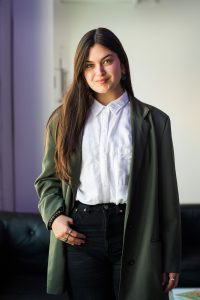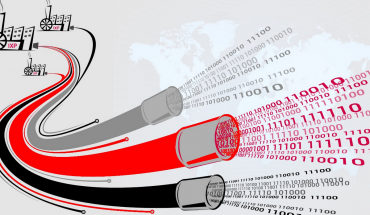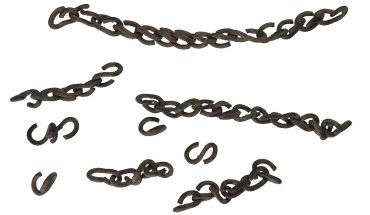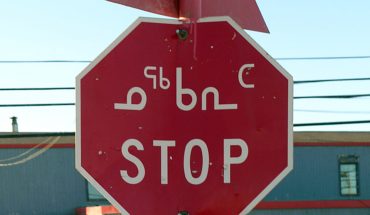Recently, I was introduced to Michelle Audoin, Co-Chair of Rethink’s Equity, Diversity + Inclusion (EDI) Working Group and Co-creator of Uncovered: A Breast Recognition Project. In honour of Breast Cancer awareness month in October, Audoin shared with me her compelling personal story and digital journey in the creation of Uncovered, an inclusive and powerful platform that focuses on the breast cancer experiences of Black, Indigenous and People of Colour (BI&POC).

Michelle Audoin, Co-Chair of Rethink’s Equity, Diversity + Inclusion (EDI)
Inspired by how Audoin’s collaborative project with Rethink Breast Cancer addresses bias and underrepresentation for BI&POC with breast cancer, I asked Audoin and Jasmine Sikand, Lead of Content, Community + Collaborations at Rethink Breast Cancer, to elaborate on the vision and underlying digital strategy of Uncovered.
Audoin explained, “Uncovered: A Breast Recognition Project is a Canadian first-of-its kind resource that I created in collaboration with Rethink Breast Cancer, a Canadian breast cancer charity. It was launched in 2020 and was developed as a personal response to my experiences and frustration related to the lack of imagery featuring Black bodies in the cancer care space.”
Said Audoin, “When I was diagnosed with metastatic breast cancer in 2017 and made the difficult decision to have a bilateral mastectomy, I had specific questions and concerns about the procedure and how it would look on my skin as a Black woman. I was never presented with images of reconstruction on women who looked like me, and my scarring concerns weren’t addressed. It made me question if breast reconstruction was really an option for me because I felt so alone and unsure.”
Audoin’s Vision for Uncovered
“My vision for Uncovered was to create a safe space where underrepresented women navigating a breast cancer diagnosis could see themselves featured prominently,” shared Audoin.
“The aim of the project,” added Audoin, “was to build community through powerful storytelling and beautiful images of us uncovering our physical and emotional scars, whilst shining a light on the disparities and inequities that exist in cancer care.”
“Initially, Uncovered focused mainly on Black women, like me, because I felt unseen and unheard. However, after the first year, not only the Black community continued to come forth asking to share their stories and experiences. Indigenous women, and women of colour also wanted to be a part of this much needed endeavour.”
Addressing Bias and Isolation
Uncovered has become a digital experience and supportive resource that is well-received, including 20.5 million people across mainstream and social media, and takes on cultural bias and health disparity in relation to BI&POC cancer care.
“Uncovered is unique in that its value extends far beyond the powerful storytelling and imagery contained within,” stated Audoin. “The Uncovered Wish List, a notable feature in the 2021 edition, seeks to address health inequities and to empower everyone who works in cancer care to become allies and changemakers by championing any of the six actionable items that the women featured in Uncovered prioritize.”
Added Audoin, “Healthcare providers and community cancer agencies can use the resource to build capacity by educating themselves to become more culturally sensitive and aware of the unique needs and barriers that often don’t get addressed. The resource provides a path forward to make changes at the personal and systemic level.”
Digital Platform for Those Around the World

Jasmine Sikand
As a producer for this project, Sikand elaborated on the value that safe digital platforms provide for BI&POC women with breast cancer.
“Rethink Breast Cancer’s strong digital platforms have provided a safe space for storytelling, connection and community over the years, mainly through social media, private support groups and website blogs,” began Sikand. “And it has been the same for the Uncovered project.”
“Our use of technology in this way,” added Sikand, “has led us to another aspect of this project we have called Uncovering, which is our ongoing content stream where people from all over the world can submit their personal stories of Uncovering and contribute to this project from the comfort of their homes. This is a huge positive of having a strong digital presence and community and being able to use social media and our blog to amplify the stories in Uncovered, fostering a deepened connection with the breast cancer community.”
Sikand also credits technology with making Uncovered a more accessible solution, allowing women and those supporting women with breast cancer, “to connect with each other and form friendships and community during a time where many people feel isolated and alone with breast cancer, especially for Black, Indigenous and People of Colour.”
Said Sikand, “We also just returned from the World Cancer Congress in Geneva, Switzerland where we presented Uncovered. This opened the doors to relationships with people from all over the world that we otherwise wouldn’t be connected with. Technology had a huge role in making this happen.”
Summed up Sikand, “The reality of this digital world means people with breast cancer are more capable of connecting with others with breast cancer and shared experiences from all over the world. This has contributed to making an isolating experience like breast cancer into one that can feel a bit more supportive through connection and community…. [and] has allowed people in the breast cancer community to feel seen, heard, supported, and represented in a way they hadn’t been before.”
And, Sikand shared how technology has underpinned other readily accessible resources, from storytelling blogs to articles to e-booklets to virtual events and support sessions have become vital for the community and social workers.
“There are certainly still accessibility barriers, privacy concerns and other barriers that exist and will arise,” commented Sikand, “but Rethink continues to evolve how to best rethink breast cancer and improve support for those impacted by breast cancer in this digital age.”
What’s next?
Audoin’s wish list incorporates other digital features, particularly greater online support capability to better serve those living in rural locations.
Said Audoin, ‘We also continue to see, even as recent as a few weeks ago, that many search engines and social media platforms often have biased algorithms. An example of this is trying to do a web search for “breast reconstruction” and finding results that are only of white people, which is what Uncovered: A Breast Recognition Project addresses through the breast reconstruction galleries.”
“Similarly, we sometimes encounter shadow bans on social media when talking about the realities of racism, representation and health equity, which hinders the ability to maximize the reach of Uncovered and other pieces of content focused on these conversations.”



